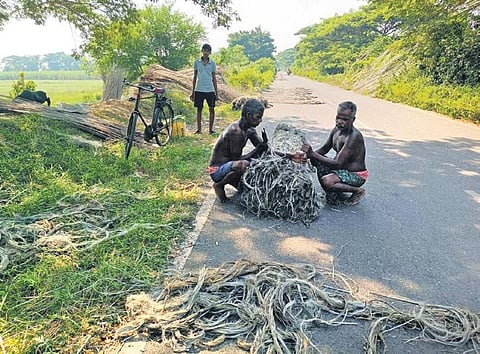

JAGATSINGHPUR: Jute cultivation has dropped by 80 per cent in the district over the last seven years, thanks to distress sale, loss coupled with lack of marketing linkages which have sent farmers away from the cash crop.From 425 hectare of crop area in 2015-2016, cultivation of jute has plunged to 80 hectare in 2022-2023. Local jute farmers are a worried lot as they face distress sale in absence of procurement facility by the government.
Farmers recall that jute cultivation was a booming business about 10 to 15 years back but gradually lost charm due to lack of procurement facilities. Back then, the government also provided seed, fertilisers and pesticides at subsidised rates.
With no procurement plan and little marketing help, local farmers continue cultivation but there are no takers for the produce from the area. Traders from West Bengal, Bihar and Jharkhand are the primary buyers who pick up the stock at throwaway prices while government has no control over them.
Local farmers allege that Central government has fixed the minimum support price of jute at Rs 5,050 per quintal but they are forced to sell it at Rs 4,000-4,200 per quintal to traders from outside the state who in turn sell it at double the price and make a fortune out of it.
Due to favourable geo-climatic condition, jute has primarily been grown in Tirtol, Kujang, Raghunathpur, Jagatsinghpur, Biridi, Naugaon and Balikuda blocks. The many water bodies and creeks on the banks of river Mahanadi, Paika, Devi, Biluakhai rivers help farmers grow the crop. However, it has become restricted to only in 80 hectare in Kujang, Biridi and Jagatsinghpur.
Dhaneswer Swain, a jute farmer from Biridi, reveals he spent a lot on fertilisers this year. “I am worried I may have to sell the produce at Rs 4,100 against the MSP price of Rs 5,050. If the government does nothing, the farmers will suffer heavy losses,” he says.
Chief district agriculture officer Sanjiv Kumar Mudali agreed that lack of procurement and marketing facilities as well as growing use of plastic bags are the main cause of decline of jute cultivation in this district. The department, he said, provides training and other assistance for awareness to farmers to cultivate the crops on a large scale.